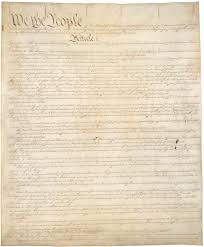constitution
英 [ˌkɒn.stɪˈtʃuː.ʃən]
美 [ˌkɑːn.stəˈtuː.ʃən]
- n. 宪法;体质;章程;构造;建立,组成;体格
使用频率:

中文词源
constitution 宪法
con-, 强调。-stit, 站,词源同stand, institute. 即站立的,比喻义国家基石,国家根本。
英语词源
- constitution (n.)
- mid-14c., "law, regulation, edict," from Old French constitucion (12c.) "constitution, establishment," and directly from Latin constitutionem (nominative constitutio) "act of settling, settled condition, anything arranged or settled upon, regulation, order, ordinance," from constitut-, past participle stem of constituere (see constitute).
Meaning "action of establishing" is from 1580s; that of "way in which a thing is constituted" is from c. 1600; that of "physical health, strength and vigor of the body" is from 1550s; of the mind, "temperament, character" from 1580s. Sense of "mode of organization of a state" is from c. 1600; that of "system of principles by which a community is governed" dates from 1730s; especially of a document of written laws since the U.S. and French constitutions, late 18c.
权威例句
- 1. The constitution prohibits them from military engagement on foreign soil.
- 宪法禁止他们在外国采取军事行动。
- 2. Brazil says its constitution forbids the private ownership of energy assets.
- 巴西称其宪法禁止个人占有能源资产。
- 3. The German constitution is an excellent model of decentralised government.
- 德国宪法是实行地方政府分权制的优秀典范。
- 4. After the war, a convention was set up to frame a constitution.
- 战后,为制定宪法组织了一次会议。
- 5. The constitution also confers large powers on Brazil's 25 constituent states.
- 宪法还赋予巴西的25个成员州很大的权力。
